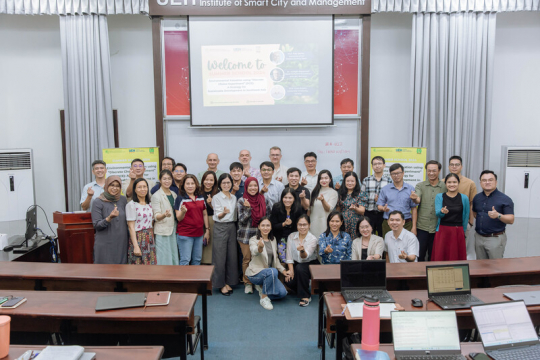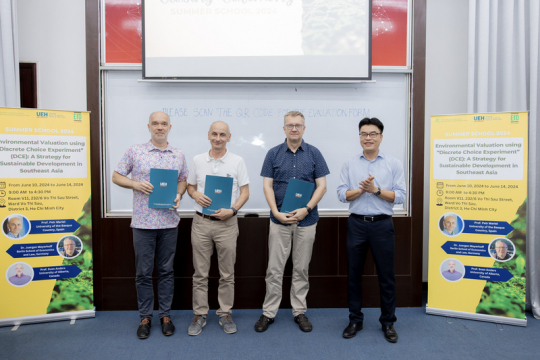Discrete Choice Experiments (DCE) was the topic when the University of Economics Ho Chi Minh City (UEH), the Economy and Environment Partnership for Southeast Asia (EEPSEA), and EfD Vietnam, hosted a successful summer school. This event brought together early-career researchers from Southeast Asia to deepen their understanding of DCE methodologies and their applications in various disciplines, including environmental valuation, health, public policy, and development.
The Summer School which took place from June 10th to 14th, 2024, welcomed 30 participants from various Southeast Asian countries, selected from over 120 highly competitive applicants. The participants had the opportunity to learn from renowned experts in the field, including Petr Mariel from the University of the Basque Country, Juergen Meyerhoff from the Berlin School of Economics and Law, and Sven Anders from the University of Alberta. Their collective expertise provided participants with a comprehensive and robust learning experience.
"The lectures were enlightening, the discussions were stimulating, and the exercises were immensely beneficial," commented Alin Halimatussadiah, Universitas Indonesia.
Interactive learning guaranteed in-depth learning
The program covered the theoretical foundations of DCEs, practical implementation steps, advanced econometric models, and limitations of the DCE approach. Through interactive lectures, hands-on exercises, and group discussions, participants gained in-depth knowledge and practical skills in designing, implementing, and analyzing DCEs for environmental and resource valuation.
Participants were tasked with submitting a concept note with a draft design of a DCE study, allowing them to apply their newly acquired knowledge to their own research projects.
Made possible through generous support
This tuition-free workshop was made possible by the generous support of UEH University and the Swedish International Development Cooperation Agency (Sida) through EEPSEA and EfD-Vietnam. Our resource persons volunteered their time and expertise without receiving any payment, making their contributions particularly commendable in advancing environmental research and sustainable development in Southeast Asia.
"The world needs choice modelers and I’m very grateful for the lecturer’s generosity in sharing their invaluable knowledge and expertise with all of us in this Summer School," said Pek Chuen Khee, Taylor's University, Malaysia.
Impact and future prospects
The success of the Summer School underscores the importance of providing specialized training for early-career researchers in the region. By equipping them with cutting-edge methodologies and fostering cross-border collaboration, this initiative builds a strong foundation for rigorous environmental research and evidence-based policymaking, ultimately supporting the region's progress toward sustainable development goals.
"I believe that the 5-day course is both engaging and fruitful. Participants undoubtedly learn a lot from our resource persons,” Pham Khanh Nam, EfD Vietnam Director.
“Equally important is the opportunity to make friends and network. After the course, we will have a Southeast Asia team dedicated to discrete choice experiments. This team could become a leading group in using discrete choice experiments for valuing the environment in the region. We may even collaborate on future projects."

